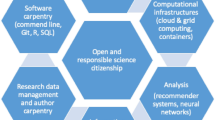Abstract
This paper is a commentary to a paper by Anne Solli, Frank Bach and Björn Åkerman on how students at a technical university learn to argue as biotechnologists. Solli and her colleagues report from an ethnographic study performed during the first semester of a 5-year program in biotechnology at a technical university in Sweden. Their study demonstrates how students begin to acquire ‘the right way’ of approaching the controversial issue of producing and consuming genetically modified organisms. In my response I discuss the ethnographic account of this particular educational practice in terms of social and cultural production/reproduction of a biotechnology community and how the participants (students and teaching professors) deal with the dialectic of individual and collective transformation. In the perspective of the biotechnology community, the work done by the teaching professor becomes a way of ensuring the future of the biotechnology community in terms of what values and objectives are held highly in the community of practice.
Similar content being viewed by others
References
Andrée, M. (2012). Altering conditions for student participation and motive development in school science: Learning from Helena’s mistake. Cultural Studies of Science Education, 7, 425–438.
Berger, P., & Luckmann, T. (1966). The social construction of reality. A treatise in the sociology of knowledge. London: Penguin Books.
Duschl, R. A., & Osborne, J. (2002). Supporting and promoting argumentation discourse in science education. Studies in Science Education, 38, 39–72.
Edwards, A. (2007). Relational agency in professional practice: A CHAT analysis. Actio: An International Journal of Human Activity Theory, 1, 1–7.
Gee, J. P. (1999). An introduction to discourse analysis: Theory and method. London: Routledge.
Gee, J. P. (2004). Situated language and learning: A critique of traditional schooling. New York: Routledge.
Kuhn, D. (1992). Thinking as argument. Harvard Educational Review, 62, 155–178.
Lave, J., & Wenger, E. (1991). Situated learning. Legitimate peripheral participation. Cambridge: Cambridge University Press.
Leontiev, A. N. (1986). Verksamhet, medvetande, personlighet. [Activity, consciousness, personality]. Moskva/Göteborg: Progress/Fram. (In original in Russian, first published 1977).
Lundegård, I., & Wickman, P.-O. (2007). Conflicts of interest: An indispensable element of education for sustainable development. Environmental Education Research, 13, 1–15.
Nielsen, J. A. (2013). Dialectical features of students’ argumentation: A critical review of argumentation studies in science education. Research in Science Education, 43, 371–393.
Roth, W.-M., Goulart, M. I. M., & Plakitsi, K. (2013). Science education during early childhood. A cultural-historical perspective. (Cultural Studies of Science Education, 6). Dordrecht: Springer.
Skolverket (2011). Curriculum for the compulsory school, preschool class and the leisure-time centre 2011. Stockholm: Swedish National Agency for Education. Retrieved January 2, 2013 from http://www.skolverket.se/publikationer?id=2687.
Solli, A., Bach, F., & Åkerman, B. (2013). Learning to argue as a biotechnologist: Dispriveliging opposition to genetically modified food. Cultural Studies of Science Education. doi:10.1007/s11422-013-9528-1.
Toulmin, S. E. (1958). The uses of argument. Cambridge: Cambridge University Press.
Wenger, E. (1998). Communities of practice. Learning, meaning, and identity. Cambridge: Cambridge University Press.
Zeidler, D. L., Osborne, J., Erduran, S., Simon, S., & Monk, M. (2006). The role of argument during discourse about socio-scientific issues. In D. L. Zeidler (Ed.), The role of moral reasoning on socioscientific issues and discourse in science education (pp. 97–116). Dortrecht: Springer.
Author information
Authors and Affiliations
Corresponding author
Additional information
Lead Editor: P.-O. Wickman.
This is a Forum response to A. Solli, F. Bach, and B. Åkerman. (2013). Learning to argue as a biotechnologist: Disprivileging opposition to genetically modified food. Cultural Studies of Science Education. doi:10.1007/s11422-013-9528-1.
Rights and permissions
About this article
Cite this article
Andrée, M. Biotechnology education as social and cultural production/reproduction of the biotechnology community. Cult Stud of Sci Educ 9, 25–30 (2014). https://doi.org/10.1007/s11422-013-9487-6
Received:
Accepted:
Published:
Issue Date:
DOI: https://doi.org/10.1007/s11422-013-9487-6




